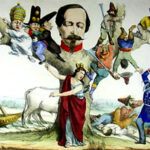7:30 PM Performance: Commentary by Leon Botstein; with Melody Moore, soprano; Russell Thomas, tenor; Paul Whelan, bass-baritone; Jessica Thompson, viola; Raymond Nagem, organ; Bard Festival Chorale, James Bagwell, choral director; The Orchestra Now, conducted by Leon Botstein; and others
Giacomo Puccini (1858–1924), Requiem (1905); Intermezzo and Act 4 of Manon Lescaut (1893); Saverio Mercadante (1795–1870), Hymn to Garibaldi (1861); excerpts from Giuseppe Verdi (1813–1901), Nabucco (1842); Amilcare Ponchielli (1834–86), I promessi sposi (1856; rev. 1872); Arrigo Boito (1842–1918), From Nerone (incomplete; 1924); Alfredo Catalani (1854–93), Loreley (1888); and Pietro Mascagni (1863–1945), Cavalleria rusticana (1890)
Through operatic excerpts and more, this concert examines the ways Italians perceived their newly unified homeland in the comparatively peaceful half-century between the Risorgimento and the First World War. Explicitly addressing key moments in the nation's history, Boito’s incomplete and rarely staged opera Nerone depicts the plight of Christians under Nero’s rule, while Saverio Mercadante’s orchestral Hymn to Garibaldi celebrates the great general’s victory. Unlike Verdi – an emblematic figure of the unification movement, whose “Va, pensiero” from Nabucco served as a patriotic anthem – Puccini took little interest in politics. Nonetheless, in commemorating the older composer’s death, his diminutive Requiem follows in a politically redolent lineage; Verdi’s own Requiem honors the passing of nationalist novelist Alessandro Manzoni, whose magnum opus was the inspiration for Ponchielli’s opera I promessi sposi. Ponchielli’s students included both Puccini and Mascagni (composer of SummerScape 2016’s mainstage opera production, Iris), whose Cavalleria rusticana celebrates Italy in ways that Puccini was often charged with failing to do. Yet the Tuscan composer identified closely with his homeland, and even in adapting the French Manon Lescaut, it was important to him that – unlike Jules Massenet, who approached their shared source material as a Frenchman – he himself could “feel it as an Italian, with desperate passion.”
